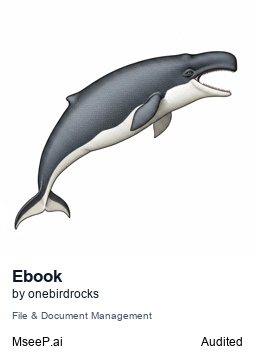About
Ebook-MCP is a Model Context Protocol server that lets LLMs interact with EPUB and PDF books via natural language queries, enabling smart library management, interactive reading, learning support, and content navigation.
Capabilities

Overview of Ebook‑MCP
Ebook‑MCP is a Model Context Protocol server that turns a collection of electronic books into an interactive knowledge base. By exposing standardized APIs for reading, querying, and manipulating EPUB and PDF files, it lets AI assistants—such as Claude or Cursor—to treat a user’s digital library like a conversational partner. Instead of manually opening a PDF and searching for a passage, an assistant can ask the server to locate chapters, summarize sections, or generate quizzes, thereby turning static documents into dynamic learning tools.
The server solves the friction that developers face when integrating LLMs with personal or institutional e‑book collections. Traditional file‑system access is cumbersome and error‑prone; Ebook‑MCP abstracts the underlying format, provides a uniform query interface, and handles complex operations like full‑text search or metadata extraction. This abstraction is especially valuable for educational platforms, research workflows, and content‑heavy applications where the assistant must retrieve context from large documents on demand.
Key capabilities include:
- Smart Library Management – List, filter, and organize books by format, author, or tags using natural language commands.
- Interactive Reading – Retrieve introductions, chapter summaries, or specific passages by referencing titles or section names.
- Active Learning Support – Generate quizzes, explain architectural differences, and propose practical exercises derived from a book’s content.
- Content Navigation – Jump to sections that mention prompt engineering, fine‑tuning, or vector databases with a single query.
These features translate into real‑world scenarios such as a developer building an AI‑powered study aid that automatically creates flashcards from lecture notes, or a researcher who wants to cross‑reference multiple technical PDFs without leaving the LLM interface. By integrating with AI workflows, developers can embed Ebook‑MCP into chatbots, IDEs, or knowledge‑graph pipelines, allowing assistants to surface relevant information instantly and keep users focused on higher‑level tasks.
Unique advantages stem from its tight coupling with the Model Context Protocol ecosystem. Because Ebook‑MCP adheres to MCP standards, it can be composed with other MCP services—such as data‑source connectors or prompt libraries—without custom adapters. This composability, combined with native support for both EPUB and PDF, gives developers a versatile, plug‑and‑play solution that elevates the way AI assistants interact with written content.
Related Servers
n8n
Self‑hosted, code‑first workflow automation platform
FastMCP
TypeScript framework for rapid MCP server development
Activepieces
Open-source AI automation platform for building and deploying extensible workflows
MaxKB
Enterprise‑grade AI agent platform with RAG and workflow orchestration.
Filestash
Web‑based file manager for any storage backend
MCP for Beginners
Learn Model Context Protocol with hands‑on examples
Weekly Views
Server Health
Information
Tags
Explore More Servers
CVE MCP Server
LLM-powered CVE lookup via Model Context Protocol
MCP MySQL Server
Execute any SQL with AI-driven flexibility
MCP Subfinder Server
JSON‑RPC wrapper for ProjectDiscovery subfinder
AML Watcher MCP Server
Docker-based AML screening via API key authentication
GitHub MCP Server
Connect GitHub to Claude Desktop with multi‑profile support
CCXT MCP Server
AI-driven crypto exchange access via Model Context Protocol